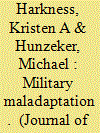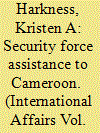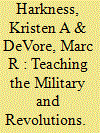|
|
|
Sort Order |
|
|
|
Items / Page
|
|
|
|
|
|
|
| Srl | Item |
| 1 |
ID:
145986


|
|
|
|
|
| Summary/Abstract |
Military coups have posed a persistent threat to political stability in Africa, undermining democratization efforts, igniting insurgencies, and leading to years of devastating military governance. Initial cross-national studies found little consistent evidence linking ethnicity to coups, leading recent formal and statistical work on coup risk and coup-proofing to largely ignore ethnic politics. This article, however, argues that in two important contexts of African political development—decolonization and democratization—ethnic politics are critical to understanding the occurrence of coups. Both case study evidence and statistical analysis of original data on African military history and ethnic politics reveal that practices of ethnic manipulation within security institutions have driven coup attempts. When leaders attempt to build ethnic armies, or dismantle those created by their predecessors, they provoke violent resistance from military officers.
|
|
|
|
|
|
|
|
|
|
|
|
|
|
|
|
| 2 |
ID:
141150


|
|
|
|
|
| Summary/Abstract |
Tactical learning is critical to battlefield success, especially in a counterinsurgency. This article tests the existing model of military adaption against a ‘most-likely’ case: the British Army’s counterinsurgency in the Southern Cameroons (1960–61). Despite meeting all preconditions thought to enable adaptation – decentralization, leadership turnover, supportive leadership, poor organizational memory, feedback loops, and a clear threat – the British still failed to adapt. Archival evidence suggests politicians subverted bottom-up adaptation, because winning came at too high a price in terms of Britain’s broader strategic imperatives. Our finding identifies an important gap in the extant adaptation literature: it ignores politics.
|
|
|
|
|
|
|
|
|
|
|
|
|
|
|
|
| 3 |
ID:
189242


|
|
|
|
|
| Summary/Abstract |
Western countries have increasingly turned to security force assistance (SFA) to build partner capacity and counter terrorist threats in weakly governed states. This trend sits uncomfortably alongside widespread pessimism that coup-proofed and patronage ridden armies can be meaningfully reformed and made combat effective. Searching for new solutions, both scholars and practitioners have converged on the idea of creating ‘enclave units’—elite forces isolated from the broader military that can be proficiently trained and then deployed on counterterrorism missions. But can enclave units resolve the fundamental interest misalignments that have undermined SFA more broadly? This article leverages the case of the Bataillons d'Intervention Rapide in Cameroon to build theoretical insights into the promises and perils of enclave units. I find that achieving combat proficiency perversely deepens autocracy by strengthening the repressive capacity of dictators. When harshening policies and further marginalization then lead to uprisings, often among ethnic minority groups, embattled autocrats redeploy western trained enclave units against civilians. Extending these insights to the shadow cases of the Iraqi Golden Division and Somali Danab suggests that an indefinite western commitment to remain in-country and directly command enclave units may be necessary to prevent their political misuse.
|
|
|
|
|
|
|
|
|
|
|
|
|
|
|
|
| 4 |
ID:
179432


|
|
|
|
|
| Summary/Abstract |
During revolutions, strategic interactions among civilian policy makers, armed forces, and opposition groups shape political outcomes—most important, whether a regime stands or falls. Students from advanced industrial democracies frequently find these dynamics counterintuitive, even after completing readings and engaging in traditional instruction methods. We therefore sought to improve pedagogical outcomes by designing a simulation based on scenarios similar to those witnessed during the Arab Spring and Ukraine’s Euromaidan Revolution. We divided students into four teams representing the regime, the armed forces, and two distinct groups of anti-regime dissidents. Rules were designed to incorporate the best recent scholarship on each category of actors’ behavior, such as the probability of military units defecting to protesters and the ability of riot police to repress urban uprisings. By forcing student teams to make decisions under time pressure, we obliged them to wrestle with the uncertainties and fears of betrayal inherent in complex civil–military emergencies.
|
|
|
|
|
|
|
|
|
|
|
|
|
|
|
|
|
|
|
|
|